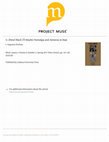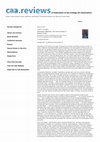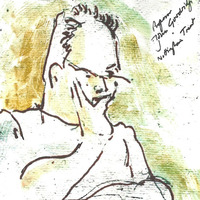Papers by I. Augustus Durham
Tarell Alvin McCraney: Theater, Performance, and Collaboration, 2020
*Page Proofs*
An intertextual examination of Moonlight (2016), both the screenplay and film wr... more *Page Proofs*
An intertextual examination of Moonlight (2016), both the screenplay and film written and/or directed by Tarell Alvin McCraney and Barry Jenkins, as a synesthetic object.

Black Camera: An International Film Journal, , 2017
In March 2014, for an article in GQ magazine, Pharrell Williams invoked the term “the new black”;... more In March 2014, for an article in GQ magazine, Pharrell Williams invoked the term “the new black”; he further elaborated on the phrase’s definition in an interview with Oprah Winfrey for her show Oprah Prime. A little over a year later, in the summer of 2015, Rick Famuyiwa’s film Dope, executively produced by Williams, was released to rave reviews. Although these two events appear disparate, this article asserts that the film is a cinematic interpretation of Williams’s ideation. By highlighting the movie’s aesthetic
nods to hip-hop—clothing, paraphernalia, music, and casting—as forms of nostalgia, and reading the protagonist’s preoccupation with attending Harvard as a form of cultural amnesia reminiscent of rhetoric from bygone cultural movements, the piece questions, what is the “new” that constitutes blackness? In like manner, does the arrival of such a category suggest that “the old black” no longer exists, or does it maintain a paradigmatic
influence which stands to impart a lesson on culture and history to the “new”?
Palimpsest: A Journal on Women, Gender, and the Black International, 2013

Journal of Religion and Health, Jan 19, 2011
Drawing on Donald Capps' discussion in Men and Their Religion (2000) on the development of the me... more Drawing on Donald Capps' discussion in Men and Their Religion (2000) on the development of the melancholy self in early childhood and the emergence of three religious impulses as a consequence of its development (the religions of honor, hope, and humor), this article focuses on the early childhood experience of Richard Pryor and the role that the religion of humor plays in helping him cope with these experiences. Particular attention is given to his grandmother's paradoxical role in his life and his identification of her as his spiritual mother. Keywords Sigmund Freud Á Grief Á Melancholy Á Lost object Á Donald Capps Á Emotional separation Á Maternal loss Á Religion of honor Á Religion of hope Á Religion of humor Á African-American humor Á Grandmother as spiritual mother Á Racism Á Father of personal prehistory Á Mother of personal prehistory The bare railway-line of their story tells of a passion honest enough to entitle it to be related…. They are real creatures, exquisitely fantastical, strangely exposed to the world by a lurid catastrophe, who teach us that fiction, if it can imagine events and persons more agreeable to the taste it has educated, can read us no such furrowing lesson in life (Meredith 1892, pp. 2–3)
Book Reviews by I. Augustus Durham
African American Review, 2021
Journal of Popular Music Studies, 2020

CAA Reviews, 2018
Depending on the context of its usage, the Spanish term género is definable as either "gender" or... more Depending on the context of its usage, the Spanish term género is definable as either "gender" or "genre." Katherine Clay Bassard takes up this dichotomy in line with questions of literacy when she opines that "[i]n speaking of gender and genre, then, [she works] from the assumption that form is not merely a matter of free choice or appropriate models but a function of how a writer perceives her/himself in the social order." This conflation suggests that whenever deployed, the context is never not haunted by the subtext as well as by the social location in which the usage finds utterance. In this same manner, when one speaks about "race," one could imagine that for some bodies of color, black ones in particular here, "[t]he fastest runner doesn't always win the race, and the strongest warrior doesn't always win the battle. The wise sometimes go hungry, and the skillful are not necessarily wealthy. And those who are educated don't always lead successful lives.
Books by I. Augustus Durham
Stay Black and Die: On Melancholy and Genius, 2023
Dictionary Entry by I. Augustus Durham
Twenty-First-Century African American Poets, Second Series, 2024
Dictonary Entry for Ronaldo V. Wilson.
In Dawes, Kwame, Ed. Twenty-First-Century African Ameri... more Dictonary Entry for Ronaldo V. Wilson.
In Dawes, Kwame, Ed. Twenty-First-Century African American Poets, Second Series. Farmington Hills, MI: Gale, 2024.










Uploads
Papers by I. Augustus Durham
An intertextual examination of Moonlight (2016), both the screenplay and film written and/or directed by Tarell Alvin McCraney and Barry Jenkins, as a synesthetic object.
nods to hip-hop—clothing, paraphernalia, music, and casting—as forms of nostalgia, and reading the protagonist’s preoccupation with attending Harvard as a form of cultural amnesia reminiscent of rhetoric from bygone cultural movements, the piece questions, what is the “new” that constitutes blackness? In like manner, does the arrival of such a category suggest that “the old black” no longer exists, or does it maintain a paradigmatic
influence which stands to impart a lesson on culture and history to the “new”?
Book Reviews by I. Augustus Durham
Books by I. Augustus Durham
Dictionary Entry by I. Augustus Durham
In Dawes, Kwame, Ed. Twenty-First-Century African American Poets, Second Series. Farmington Hills, MI: Gale, 2024.
An intertextual examination of Moonlight (2016), both the screenplay and film written and/or directed by Tarell Alvin McCraney and Barry Jenkins, as a synesthetic object.
nods to hip-hop—clothing, paraphernalia, music, and casting—as forms of nostalgia, and reading the protagonist’s preoccupation with attending Harvard as a form of cultural amnesia reminiscent of rhetoric from bygone cultural movements, the piece questions, what is the “new” that constitutes blackness? In like manner, does the arrival of such a category suggest that “the old black” no longer exists, or does it maintain a paradigmatic
influence which stands to impart a lesson on culture and history to the “new”?
In Dawes, Kwame, Ed. Twenty-First-Century African American Poets, Second Series. Farmington Hills, MI: Gale, 2024.